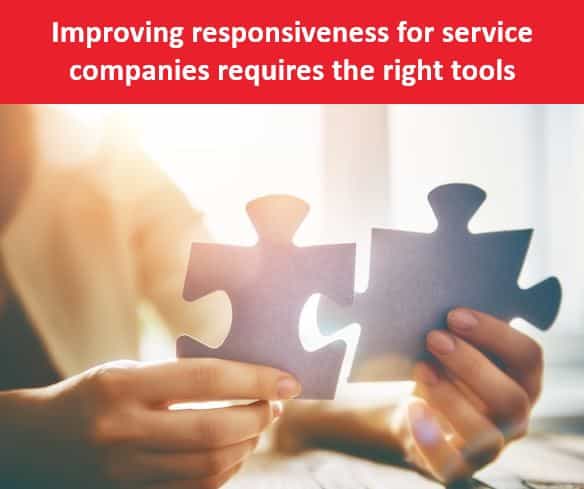
- Customer Satisfaction
- Gestion d’interventions
- Maintenance
- Optimization
- Productivité
The Keys to Beating the Competition in Field Service Management
Competition is the biggest threat to every field service provider. The service market is constantly growing, and the number of players in every area of field service is exploding. As more and more companies transform to digital operations, using new technologies is no longer optional. It has become essential for every field service provider that wants to survive, thrive and provide the best possible customer service. There are 2 keys to using new technologies to surpass the competition: Put customers at the center of your strategy, and understand how to take advantage of the business opportunities and performance enhancements new technologies enable
Put customers at the center of your strategy
The top field service companies put their customers at the center of everything they do. They understand that it’s far easier and less expensive to keep satisfied customers than to win new ones. Customer satisfaction is their top priority. And everyone in the company — from senior managers to field technicians — is completely focused on keeping customers happy.
Keep customers informed
The days when customers would wait for hours for a technician to arrive and troubleshoot issues with their equipment are over. Today’s world moves at a much faster pace and customers want to know exactly what time technicians will arrive. If you’re still using an Excel spreadsheet and paper forms to schedule and manage service calls, you have no hope of giving customers the information they want. Your competition will do it for you. Field service management software with advanced customer communication capabilities is essential to meet customer expectations. Now, you can send customers an email or a text message telling them the technician is on their way to the appointment and exactly what time they expect to arrive. This helps customers plan their time. And, if customers are not onsite when the technician visit is over, they’ll appreciate receiving an automated message confirming the service call is complete. The ability to instantly communicate is equally important when sending service reports to customers. Paper reports are often poorly completed with illegible writing, forcing administrators to re-enter information so a “clean” and professional report can be sent to the customer. This extra processing task delays communications with the customer. With customized field service management software, technicians can use their mobile app to quickly and easily complete the report, ask customers for their electronic signature, and email it to them with a single click.
Offer customers solutions that are tailored for their issues
Field service management software allows you to collect, cross-reference and process all of the information in your customer database, including the fleets of equipment you maintain. As a result, you can identify trends and typical reasons for breakdowns on different types of equipment to anticipate failures. This ability allows you to create customized maintenance plans based on customer needs to improve first-time fix rates and operate in a more profitable way. It’s better to send a technician during the critical time period when failures are most likely to occur than on a scheduled date when everything is fine. Customers also like this type of maintenance plan because they can optimize operating time for their equipment to reduce downtime and improve productivity.
Put new technologies to work for your business
With customers at the heart of your strategy, you’re in a good position to grow your business. But, you still have to know your customers well. There’s no secret to attaining this knowledge: new technologies that have become available in recent years help you understand who your customers are and what they expect from you. Your top competitors already know who their customers are, how they work and what they want. With deeper customer insight, you can go beyond simply being good at what you do to delivering the best possible quality of service. Here’s how new technologies help you reach this level of excellence.
The Internet of Things and predictive analysis anticipate breakdowns
The connected objects revolution has had a significant impact on the service world. More and more equipment is equipped with sensors that monitor operating status and warn of faults in real time, or prevent faults by intervening just before they occur.
Artificial intelligence optimizes service scheduling
People have been talking about artificial intelligence for a few years now, but the technology has burst forth in the service world to become a reality. And it will change things in the years to come in ways we can’t yet imagine. With the increasing volumes of data being generated by connected equipment and machines, analytics technologies are being rapidly developed to help people and systems keep up with, and make the most of, the information flowing in. These advances are just another reason why field service providers need to move away from paper processes if they are to have any hope of outperforming the competition. Going digital is no longer an option. It’s an obligation. Top field service providers turn to artificial intelligence because they understand it’s the only way to exploit the masses of data being generated by their customers’ equipment and to optimize their technicians’ travel schedules. Artificial intelligence makes it possible to consider a range of parameters when planning service calls, including:
-
The type of service needed
-
Technician locations and skills
-
Traffic conditions
-
Parts required
-
Parts inventories and stock locations
With artificial intelligence, field service providers have the information needed to get the right technician to the right location at the right time to maximize the chances of resolving the customer issue on the first visit.
Augmented reality helps mobile technicians at customer sites
New technologies can also help field service technicians when they need assistance to complete a job at a customer site. For example, augmented reality can be used to project information, such as equipment schematics and user guides, directly onto the technician’s mobile device or connected glasses to help them identify and resolve equipment issues. Technicians can even use the technology to request live assistance from remote experts and intuitively interact with them to successfully complete tasks.
Virtual reality to train your service technicians
Virtual reality is not as directly related to artificial intelligence as the other technologies we’ve described, but it definitely has a place in the world of field service. With virtual reality, technicians can use virtual models of equipment to:
-
Simulate equipment failures and responses
-
Train on new equipment and types of service
-
Prepare for professional certification exams
-
Practice for challenging and complicated service tasks
In fact, virtual reality is already being used in United States today for technician training.
Our similar articles.
-
- Mobile App
- Gestion d’interventions
- service companies
- responsiveness
Improving responsiveness with an intuitive scheduling tool and mobile app
April 6, 2022 -
- Technician
- Field Service Management
- Optimization
4 tips to optimize technicians’ schedules
August 16, 2018 -
- Software
- Field Service Management
- Gestion d’interventions
- Secteurs d’activité
- Optimization
Handbook for Heavy Equipment Rental companies
July 8, 2019


